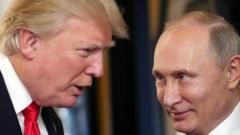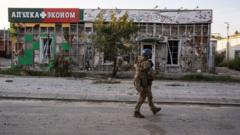Donald Trump recently intensified his rhetoric towards Russian President Vladimir Putin, urging him to end the ongoing war in Ukraine or risk facing significant economic penalties. Posting on Truth Social, Trump framed the negotiation of peace as a "big favor" to Putin and hinted at imposing high tariffs if the war persists. Despite Trump's promise to negotiate a resolution quickly if he were in office, skepticism remains in Ukraine regarding the effectiveness of his proposed measures.
Trump Issues Ultimatum to Putin, Demands End to Ukraine Conflict or Face Sanctions

Trump Issues Ultimatum to Putin, Demands End to Ukraine Conflict or Face Sanctions
Former President Trump's stern message to Putin highlights the ongoing conflict in Ukraine and hints at potential new sanctions.
Trump's remarks come as both Ukrainian President Volodymyr Zelensky and Russian officials consider the potential pathways to peace. While Zelensky insists on the necessity of U.S. involvement in any peacekeeping efforts, the reaction in Kyiv to Trump's claims suggests people are eager for concrete actions rather than mere words.
In assessing the situation, Trump implied the war could have been avoided during his presidency, stating, "We can do it the easy way, or the hard way - and the easy way is always better." Korean War veteran and former special representative to Ukraine, Kurt Volker, discussed Trump's threats as a means to compel Putin towards a ceasefire, although skepticism surrounds the likelihood of any substantial agreement being reached.
As discussions continue, international observers remain wary of how Moscow may react to Trump's sanctions threats, with some Russian media portrayals suggesting a possible shift in the Kremlin's hardliner stance. Ultimately, while Trump's statements may resonate with some, the prevailing sentiment in Ukraine is one of caution given the long history of conflict.
Trump's nuanced pitch also included an overt reference of respect for Soviet sacrifices in World War II, though there were notable inaccuracies in his historical claims. Whether his approach can yield tangible results remains uncertain, as the conflict drags into its second decade.
In conclusion, while Trump's engagement with Putin has garnered attention, it leaves many in Ukraine wondering what concrete steps may follow this heightened rhetoric.
### Summary:
Former President Trump pressures Vladimir Putin to conclude the war in Ukraine, threatening new sanctions if negotiations are not initiated soon. Both sides express varying degrees of readiness for discussions; however, the response in Ukraine underscores a desire for meaningful actions over political rhetoric.
In assessing the situation, Trump implied the war could have been avoided during his presidency, stating, "We can do it the easy way, or the hard way - and the easy way is always better." Korean War veteran and former special representative to Ukraine, Kurt Volker, discussed Trump's threats as a means to compel Putin towards a ceasefire, although skepticism surrounds the likelihood of any substantial agreement being reached.
As discussions continue, international observers remain wary of how Moscow may react to Trump's sanctions threats, with some Russian media portrayals suggesting a possible shift in the Kremlin's hardliner stance. Ultimately, while Trump's statements may resonate with some, the prevailing sentiment in Ukraine is one of caution given the long history of conflict.
Trump's nuanced pitch also included an overt reference of respect for Soviet sacrifices in World War II, though there were notable inaccuracies in his historical claims. Whether his approach can yield tangible results remains uncertain, as the conflict drags into its second decade.
In conclusion, while Trump's engagement with Putin has garnered attention, it leaves many in Ukraine wondering what concrete steps may follow this heightened rhetoric.
### Summary:
Former President Trump pressures Vladimir Putin to conclude the war in Ukraine, threatening new sanctions if negotiations are not initiated soon. Both sides express varying degrees of readiness for discussions; however, the response in Ukraine underscores a desire for meaningful actions over political rhetoric.






















